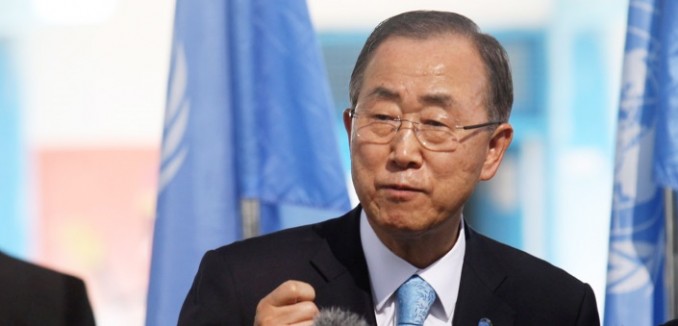Outgoing UN Secretary-General Ban Ki-Moon on Sunday became the latest world leader to criticize last week’s vote by UNESCO, the world body’s cultural organization, in favor of a resolution that denied Jewish and Christian historical ties to the Temple Mount in Jerusalem.
The resolution only uses Muslim names for Jerusalem’s holy sites, and accused Israel of “provocative abuses that violate the sanctity and integrity” of the area.
“The Secretary-General reaffirms the importance of the Old City of Jerusalem and its Walls for the three monotheistic religions and stresses the importance of the religious and historical link of the Jewish, Muslim and Christian peoples to the holy site,” his office said in a statement.
It went on to note that “The Al Aqsa Mosque/Al-Haram al-Sharif, the sacred shrine of Muslims, is also the Har HaBayit—or Temple Mount—whose Western Wall is the holiest place in Judaism, a few steps away from the Saint Sepulcher church and the Mount of Olives, which is revered by Christians….Any perceived undertaking to repudiate the undeniable common reference for these sites does not serve the interests of peace and will only feed violence and radicalism.”
Among the other leaders to express their concern was UNESCO’s own director-general, Irina Bokova. “In this microcosm of humanity’s spiritual diversity, different peoples worship the same places, sometimes under different names,” she said in a statement on Thursday. “The recognition, use of and respect for these names is paramount.”
Among the others to have expressed their opposition were Israeli Prime Minister Benjamin Netanyahu, President Reuven Rivlin, and a bipartisan group of 39 members of Congress. The Obama administration also weighed in: a senior official told The Jerusalem Post before the vote that “One-sided, unhelpful resolutions have been a recurring challenge at UNESCO in recent years, and the United States has strongly opposed these resolutions at the UNESCO Executive Board. We will not hesitate to use our vote at the current Board meeting to oppose these resolutions.” Indeed, the U.S. was one of only six countries to vote against the resolution, along with Estonia, Germany, Lithuania, the Netherlands, and the UK.
In contrast, the vote was praised by the Palestinian terrorist group Hamas. “We commend the vote at the UNESCO that denied any historic claims between Jews and the al-Aqsa Mosque and its Western Wall,” spokesman Izzat al-Resheq said in a statement to Al-Jazeera. Fatah, the ruling party of the Palestinian Authority, also weighed in:
Fatah praises UNESCO decision as 'historic and strategic victory' for the Palestinians, says Jews have no historical ties to Jerusalem.
— Khaled Abu Toameh (@KhaledAbuToameh) October 13, 2016
The official Palestinian position—as expressed in the Palestinian National Charter posted on the website of the Palestinian Authority’s United Nations delegation—is that “the claims of historic and spiritual ties between Jews and Palestine are not in agreement with the facts of history or with the true basis of sound statehood.” At the Camp David summit in 2000, then-Palestinian leader Yasser Arafat unsettled President Bill Clinton by denying that there had ever been a Jewish temple in Jerusalem. Arafat’s successor, Mahmoud Abbas, has repeatedly and explicitly lashed out against suggestions that Jews have links to Jerusalem, which is mentioned by name over 600 times in the Jewish bible. “The al-Aqsa is ours…and they have no right to defile it with their filthy feet,” Abbas said in a speech last year. “We will not allow them to, and we will do everything in our power to protect Jerusalem.”
Attempts to erase the well-established historical connection between Jerusalem and the Jewish faith, which The New York Times noted in October led many Palestinians to “increasingly [express] doubt that the [Jewish] temples ever existed,” are common in Palestinian discourse. Days after the Times report was published, the Mufti of Jerusalem, who was appointed by Abbas, claimed that the Temple Mount has been the site of a mosque “since the creation of the world” and that it never housed a Jewish temple, despite ample evidence to the contrary.
David Hazony, editor of The Tower, wrote in 2007 that “Palestinian leaders, writers, and scholars have embarked on a campaign of intellectual erasure…aimed at undermining the Jewish claim to any part of the land.”
Jewish, Christian, and other non-Muslim visitation to the Temple Mount currently remains highly restricted. The Islamic Waqf, which administers the site, only allows non-Muslims to use one of the complex’s eleven entrances, and non-Muslims are forbidden from praying, singing, or making any kind of religious display.
[Photo: Abed Rahim Khatib / Flash90]




